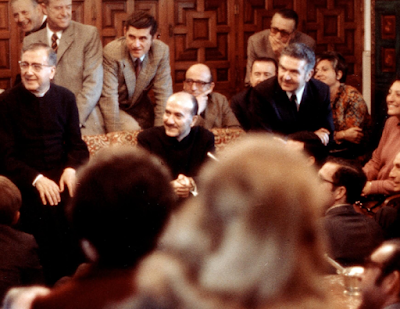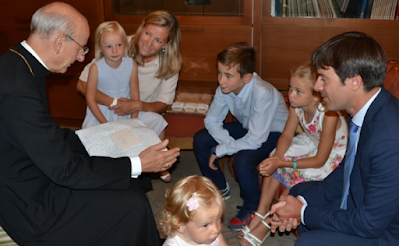Motu proprio "Ad charisma tuendum": some reflections
"The only ambition, the only desire of Opus Dei and each of its members is to serve the Church as the Church wants to be served, within the specific vocation God has given us," stressed St. Josemaria, the Founder of Opus Dei.
Pope Francis, the vicar of Christ, has just issued "Ad charisma tuendum" for the Opus Dei Prelature which literally means "to safeguard the charism."
The charism of Opus Dei that needs to be safeguarded, the Pope says, includes its "task of spreading the call to holiness in the world, through the sanctification of work and family and social commitments.” He also wanted "to promote the evangelizing action carried out by its members in the world."
Some points I would like to note:
- Filial acceptance by the Opus Dei Prelature. Because Opus Dei loves the Pope and its own God-given mission, it received the Motu Propio like a good son. Its Prelate, Msgr. Fernando Ocariz, declared that "we filially accept" the decision and asked the people of Opus Dei to make the Pope's invitation "resonate strongly in each and every one of us." To resonate, the dictionary tells us, means to continue to produce a loud, clear and deep sound for a long time. St. Josemaria teaches: "Your deepest love...your most complete obedience and your warmest affection have also to be shown towards the Vicar of Christ on earth."
- Basis of the decision. The Pope makes decisions based on in-depth studies and this decision, he says, is "in harmony with the testimony of the Founder, St. Josemaría Escrivá de Balaguer, and with the teachings of the conciliar ecclesiology regarding personal prelatures." The Vatican has been studying personal prelatures and the relationship between hierarchical gifts and charismatic gifts, which as the Q&A of the prelature points out, are used by the Holy Spirit to guide the Church. In the Vatican study of 2016, they refer to Benedict XVI who said that "essential institutions are also charismatic and the charisms, in one way or another, must be institutionalized." Also, the Pope means well for Opus Dei. Pope Francis, as a famous Jesuit intellectual described his background upon his election, is "a friend of Opus Dei." When a journalist asked Pope Francis about the intent of the Motu Proprio, which some have interpreted negatively, Pope Francis said: "I’m a very close friend of Opus Dei, I love them a lot and the good they do is very great." He also explained that canon lawyers of Opus Dei worked on this with the Vatican.
- A feature of the original charism is that the prelate is not a bishop. I have always heard from the previous prelates what the present prelate has said: "the episcopal ordination of the Prelate was not and is not necessary for the guidance of Opus Dei." Remember: The Founder was not a bishop, and he is the model for all the future heads of Opus Dei on how they are to lead. Bl Alvaro, his most faithful successor, even wanted to resign "if it was deemed necessary that the Prelate be a bishop," until he was convinced by St Pope John Paul II. (See Javier Medina, Alvaro del Portillo, Rialp) This implies that he never heard St. Josemaria—the person who received the charism—expecting the future prelates to be bishops. This is a feature of the charism that the Pope wants to protect. The only time the Pope specified the idea of protecting the charism is when he said: the Motu Proprio is intended "to strengthen the conviction that, for the protection of the particular gift of the Spirit, a form of governance based on charism more than on hierarchical authority is needed. Therefore, the Prelate shall not be honoured with the episcopal order." This is the feature of the charism that "must be institutionalized" in the words of the principle enunciated by Pope Benedict XVI.
- Nothing changes in the nature of Opus Dei. When the governance reform of the Roman Curia came out, the Prelate pointed out that this "in no way modifies the essential nature of the Prelature of Opus Dei." The Q&A at the Opus Dei website points to the specific area affected: "The change is in the Prelature’s relations with the Holy See. The Motu Proprio does not directly introduce modifications in the governance of the Prelature, nor in the relations of the authorities of the Prelature with the bishops." As Bp. Juan Ignacio Arrieta, a member of the Curia and of Opus Dei, explained: Curial organization often changes, but it does not change the nature of what is administered. Shrines will always be shrines; seminaries will always be seminaries, but the Curial department assigned to oversee them keeps on changing. Opus Dei's shift to the Dicastery of Clergy, said the Prelate, is due to the "many matters" related to clergy that the prelature brings up to the Curia. And Praedicate Evangelium, the very reform document of the Curia, indicates that the various dicasteries are "all juridically equal."
- Stress on charismatic dimension strengthens Opus Dei's family atmosphere and the fatherhood of the prelate. This is the key point that the present Prelate, Msgr. Fernando Ocariz, focused on in his response: the Prelate is "above all, a father." This means all the other aspects of his role, such as guiding and ruling, are secondary. One of the beautiful gifts of God for Opus Dei is its family atmosphere, where its head is affectionately called "Father," and he truly acts like a father to his children: sending them heart-warming letters regularly, teaching them as a father talks, caring for them with the love of a father, etc. So when the Pope says in the document that "a form of government based more on charism than on hierarchical authority is needed," he is strengthening this fatherly love and Opus Dei's family character. And as I wrote in my book, Jesus-Centered, following the thought of St. Thomas: "In the family, we can develop the most important virtue of love in the easiest way." And love is the essence of the call to holiness that Opus Dei is called to spread, through its charismatic gift from the Holy Spirit who is Love in person.
- Stress on charismatic dimension does not remove the prelature's hierarchical nature. The prelate—appointed by the Pope, the highest hierarchical authority—is necessarily a priest, and therefore will always be part of the Church hierarchy, because the "hierarchical priesthood", as the Catechism indicates, is "of bishops and priests." (CCC 1547). By definition, a prelate is "incumbent of...an ecclesiastical office with special and stable jurisdiction in the external forum and with special precedence over other ecclesiastical offices," and therefore always part of the hierarchy.
- As Supernumerary Apostolic Protonotary, the prelate is a "member of the highest college of prelates," according to the Catholic Encyclopedia. As such he belongs to the Papal Household, specifically to the Pontifical Family, which includes key dignitaries such as the Substitute of the Secretariat of State (which John Allen calls "the single toughest job in the Catholic Church" after the Pope), the Secretary for Relations with States, and the President of the Pontifical Ecclesiastical Academy.
- Hierarchy is "totally" for holiness. Still, it is important to stress what the Catechism teaches: Mary is more important than Peter; holiness is more important than hierarchy. "The 'Marian' dimension of the Church precedes the 'Petrine.'" That is why "the Church's structure is totally ordered to the holiness of Christ's members." (CCC 773) Power and authority are all in the service of what Christ calls "the one thing necessary"—a relationship that unites with him. (Lk 10:42) What is most important for the Church is that all Christians become saints—persons centered on Jesus. What is most important is the humility, simplicity and the be-it-done-to-me of Mary. The homemaker of Nazareth lived without any "human glory" so that all glory goes to God alone. This is the ideal that St. Josemaria said is God's design for Opus Dei—a point he put in Opus Dei's Statutes. (89. § 1) Any move that further bolsters the true sanctification of Catholics is good for the Church and for Opus Dei.
Relevant articles:
Answer to some attacks against Pope Francis
Opus Dei: God's work to sanctify the world from within - an explainer on Opus Dei mainly using the words of St. Josemaria
.webp)














No comments:
Post a Comment